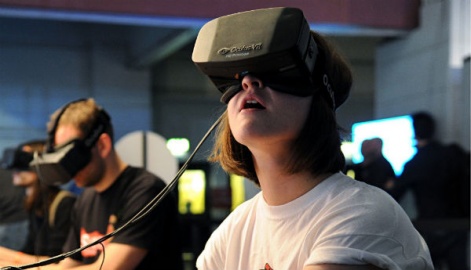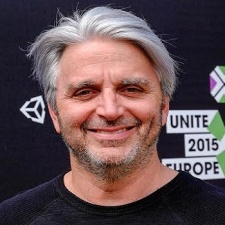Tucked away in a quiet boardroom of Unite Boston Unity CEO John Riccitiello has, to all intents and purposes, devolved into a caffeine-based life form.
"I've had about four hours sleep," he admits, fresh off the stage from his opening keynote. His PR representative suggests getting him a cup of coffee. I suggest setting up an intravenous drip of Red Bull.
Riccitiello is used to hard schedules though. Now in his tenth month as CEO of Unity, this is the man that steered Electronic Arts through a profit slump and diversified their business model to smash profit targets year-on-year.
Standing at the helm of Unity, Riccitiello made clear at Unite 2015 Boston that he sees virtual reality on the horizon - and he's sailing straight towards it.
Full steam ahead
12 out of the conference's 74 sessions were devoted directly to VR development tips. Interestingly, while it is Unity that powers around 90 percent of all VR demos, Riccitiello is coy about where Unity stands in the dogfight between companies like Oculus, Google, and Sony.
"Unity is a content creation company for things that move in 3D space," he says.
"We are also increasingly now an end to end solution for getting that content to platforms, monetization, and discovery.
"That's what we're about and we're going to support whatever platform whether it's Oculus or Vive or whatever, and there will be more. It's almost hard to think of a top 100 company that's not in it. I mean, the only one that isn't is Apple...
We're going to support whatever platform whether it's Oculus or Vive or whatever.John Riccitiello
"Though Apple never tells you what they're working on until they're ready anyway."
He points towards the emergence of Facebook in the 2000s.
"I was talking some months ago with Mark [Zuckerberg] and he said, 'look, other companies were in a better position to dominate social media then we were when we started ten years ago.
"But we were maniacally focused on the user experience, and no other company really got there. The startup came out of nowhere, and the underdog won.'"
So for now despite its clear interest in equipping its community with the tools to create VR, Unity is parking itself firmly on the fence - but a tall fence nevertheless, where it can overlook all the developers using its technology to facilitate that future.
Money, money, money
Elsewhere, monetization was a key theme of the conference.
"We understand as hard as it is to build a game, it can be as hard to monetize and discover that game," Riccitiello said on stage in his opening address, and pointed to the fact that 22,000 games are currently live with Unity ads.

So how are we going to monetize virtual reality?
"Yeah I'm not too worried about that," Riccitiello shrugs. "In general all content is monetized by two things - either you pay to access it outright or through a subscription, or you have an advertising model.
I think the year for VR and AR is likely to be 2020.John Riccitiello
"Look at film: it can be monetized by selling tickets, it's a premium product primarily, but if you arrive early you also get 20 minutes worth of advertisements. Then there's Netflix.
"In the VR model, you might need to pay for an experience like a traditional console or PC [game]. My personal view is that I'm a greater believer in premium models than I am ad-driven models for VR.
"For VR, it's going to be premium driven."
Indeed, the high intitial costs of virtual reality mean that a premium model will suit an audience with the cash to splash. With so much power required to run VR, for the forseeable future it appears that the industry will cater to those with the disposable income to buy the expensive technology it needs.
"2016 is not a consumer marketplace for VR," says Riccitiello.
"There's not the mass market PCs [to run it.] I think it's got more promise than most people think, but on the other hand, it's going to take longer than most people think. I think the year for VR and AR is likely to be 2020."
If there are ads in VR, Riccitiello believes they need to be well-placed to please the desires of a discerning modern audience.
"One of the greatest unremarked advances in technology was the channel changer which occurred when I was 8 years old. So you got given an actual controller in your hand, which meant rather than getting off your ass you could change channel if there was a bad ad.
"Now the user has a lot of control now, you can skip and interact with in games, and that's not going away so the advertising you have has to actually meet a need."
The result for VR, he argues, should be ads that people actually enjoy. Entertaining ads like we see in the Superbowl or product placement that is a favorite of Hollywood producers.
Deeper magic
Either way, while adverts call upon us to expand our possessions Riccitiello believes the nature of VR calls into question the very nature of ownership.
Riccitiello believes the nature of VR calls into question the very nature of ownership.
"In your house or apartment there are things that you don't interact with everyday," he explains. "Your art, your carpet, your view out your window, your paint - all these things are your possessions. A lot of these possessions and photographs you're really proud of and you've paid a lot of money for.
"Well, you can have all of those things in your VR or AR world. So one of the things we get to in VR and AR is the fundamental question of what is a possession? What do you own? What does it matter that you own? You can own everything cheaply.
"Now you can't drink your Diet Pepsi or whatever, you still need that. But certainly the art and the movies and the music and the view and the presence of your friends and your conversation [can be replicated.]
"Virtually anything that you would own that you wouldn't have to touch, the idea of this stuff," he trails off thoughtfully.
"I don't know where it stops."













